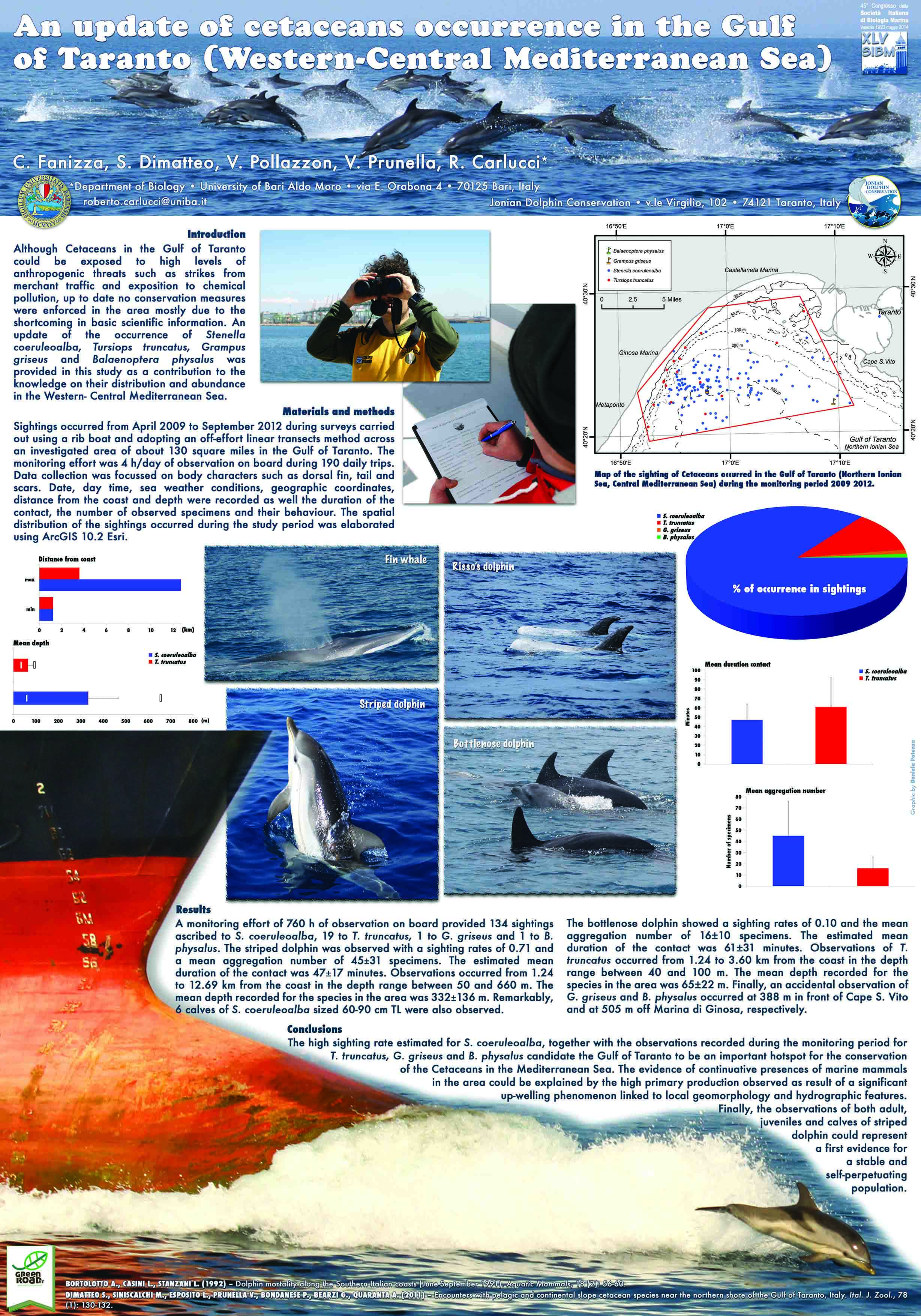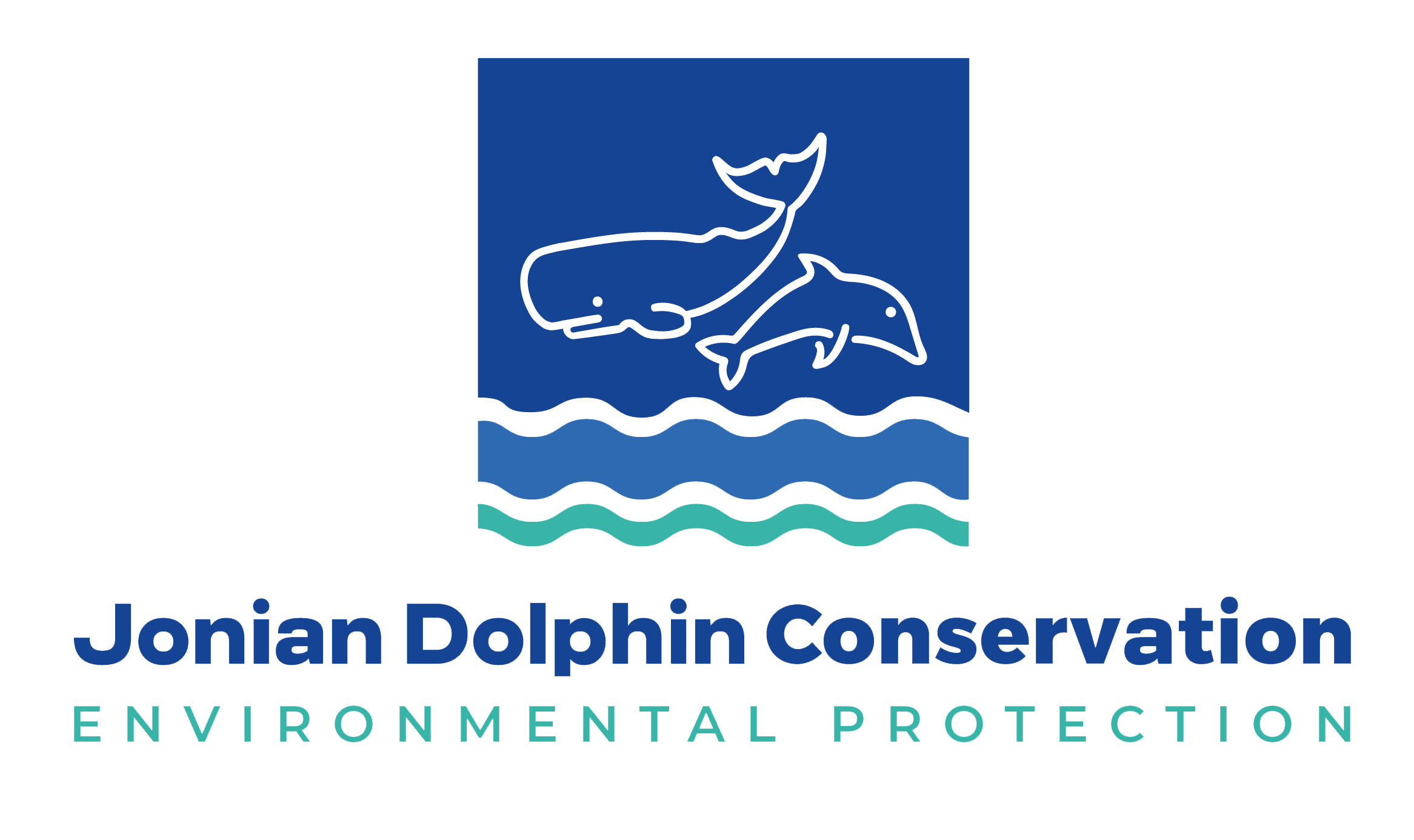Jonian Dolphin Conservation is a scientific organization conducting research on the cetaceans in the Gulf of Taranto, in the northern area of the Ionian Sea.
When it comes to the conservation of the marine environment, the experience, the skills and the knowledge of our team of qualified experts provide a deep, as well as all-encompassing level of research.
JDC is specialized in the management of marine projects, with a particular focus on the study of various environmental impacts. We design and conduct Marine Mammals Surveys availing ourselves of visual and acoustic equipment operated by our skilled personnel.
We coordinate human resources, equipment, logistics, and data analysis, in order to collect and provide you with the necessary information that will allow you to continue with the development of your own projects.
We conduct a dedicated program of innovation in the study of marine mammals and underwater acoustics through the development of technologies that will improve our research and help us preserve and protect the marine environment. Our technological skills, our competence and ability to work at sea, the experience we have gained in different sectors in over 10 years of activities, paired with the imagination and the ingenuity of our staff and crew, will make us the perfect partner for the realization of your projects. The projects to which we apply and dedicate our capabilities are often of various natures, and they are always thoroughly researched. If you would like to receive detailed information, please do not hesitate to contact us.
All of our research activities are carried out in close collaboration with the Department of Biology UNIBA. in 2009 we started a data collection phase with standardized methodology about the distribution of cetaceans in the Gulf of Taranto, followed by data processing and publications.
In these years we have been preparing new emerging and existing lines of research in collaboration with other national and international institutions, which we hope will contribute to condense a critical mass of studies and a network of interests focused on the need to preserve this important component of the biological Mediterranean diversity We are currently involved in the DOLPH-KIN project with the Ecole Pratique des Hautes Etudes - Muséum National d'Histoire Naturelle in Paris, and with the Department of Biology UNIBA.
In addition, we are developing an innovative photographic catalogs analysis system for photo identification with the Department of Biology UNIBA, and in close collaboration with the ' Institute of Intelligent Systems for Automation - National Research Council - CNR - ISSIA Bari. This will enable us to implement a short analysis on the behavioral aspects.
In line with the principles of the Marine Strategy, and with particular reference to the Descrittore 11, we are working on acoustics analyses with the ' Institute for Coastal Marine Environment - National Research Council - Torretta Granitola (TP).
Since 2013 we have been carrying out out specialization courses on the behavior of marine mammals and the protection of the species at the Centro Addestramento Aeronavale della Marina Militare Italiana Reparto Addestramento Tattico.
Jonian Dolphin Conservation, Department of Biology - University of Bari Aldo Moro, and CoNISMa Studies, from the 27th of April to the 4th of July of 2016 were in charge of the monitoring of cetaceans in the Ligurian Sea, Tyrrhenian Sea, Ionian Sea and Adriatic Sea aboard the AMERIGO VESPUCCI training ship. In occasion of its 85th anniversary, and after a long break due to the modernization operations, the most admired ship of the Italian Navy returned to the sea, once again sailing as the undisputed ambassador of our history and our national traditions during the Pre Campagna 2016 dual use.
Responsible for the Operative Protocol for Monitoring of the Cetaceans were Dott. Roberto Carlucci, from the Department of Biology of the University of Bari, Aldo Moro, and Dott. Carmelo Fanizza, President of the Jonian Dolphin Conservation.
The Gulf of Taranto (Northern Ionian Sea, Central Eastern Mediterranean Sea) covers an area of 14000 km² and it involves the coasts of three regions of South Italy: Puglia, Basilicata and Calabria. The boundary line that encloses the Gulf extends from Santa Maria di Leuca (in Puglia) to Punta Alice (in Calabria) and is 60 nautical miles long. Juridically, the Gulf is called "historic bay" by the Presidential Decree n. 816 of 26 April 1977 and therefore Italy has always considered it as an inland sea which is part of the territorial waters under the complete jurisdiction of the State. The basin is characterized by a complex morphology with a narrow continental shelf and a steep slope, with the presence of numerous channels in the western sector and terraces in the eastern one, both descending towards the NW-SE submarine canyon system in the "Valle di Taranto" . This singular morphology involves a complex distribution of water masses with a mixture of surface waters and depths, with the occurrence of a high seasonal variability in upwelling currents.
“Video 69 days along the Italian coast "”
The Scientific Committee is the warrantor of the rigorous scientific quality of the work of the Association. It is involved with the preparation and elaboration of all documents and tasks entrusted to the JDC, in particular:
• The collection, storage and dissemination of information, relevant and objective data, research and monitoring activities carried out by the Association.
• Conducting scientific research and surveys, preparatory studies and feasibility studies in the field of marine environment and coastal environment and protection of cetaceans.
• The publication of an annual report on matters related to field activities of the Association, with the reporting of examples of good practice.
• The publication of thematic reports based on the results of the analyses, research and investigations conducted.
• The development of a communication strategy and the promotion of a dialogue with the public in order to raise public awareness on issues concerning the marine and coastal environment and the protection of cetaceans.







